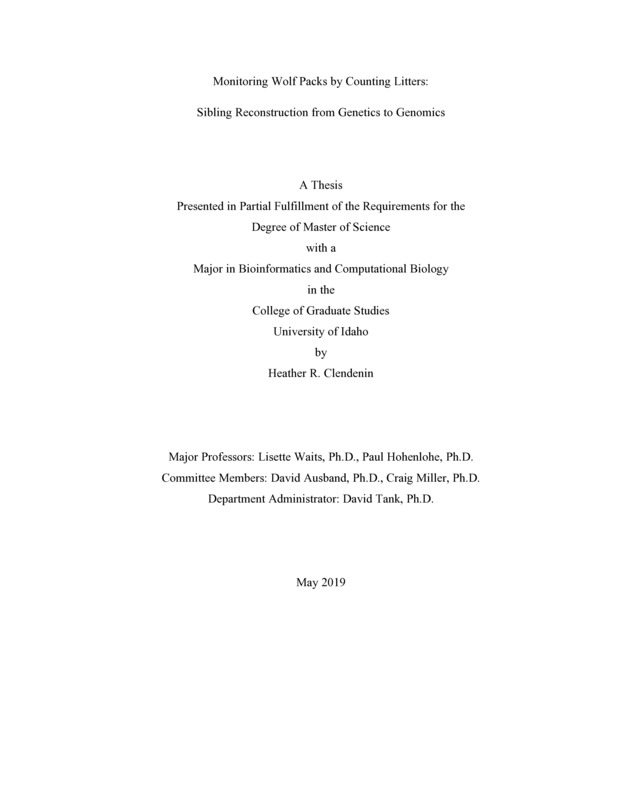Monitoring Wolf Packs by Counting Litters: Sibling Reconstruction from Genetics to Genomics
Clendenin, Heather Rose. (2019-05). Monitoring Wolf Packs by Counting Litters: Sibling Reconstruction from Genetics to Genomics. Theses and Dissertations Collection, University of Idaho Library Digital Collections. https://www.lib.uidaho.edu/digital/etd/items/clendenin_idaho_0089n_11493.html
- Title:
- Monitoring Wolf Packs by Counting Litters: Sibling Reconstruction from Genetics to Genomics
- Author:
- Clendenin, Heather Rose
- ORCID:
- 0000-0002-1573-3739
- Date:
- 2019-05
- Keywords:
- genetics genomics harvest management sibship reconstruction wolves
- Program:
- Bioinformatics & Computational Biology
- Subject Category:
- Bioinformatics; Wildlife management; Wildlife conservation
- Abstract:
-
Parameters of reproductive success are critical to the management of wildlife populations. Genetic monitoring can provide this demographic information when traditional methods aren’t tractable. This study demonstrates a novel application of genetic data to estimate a minimum annual count of breeding packs of gray wolves (Canis lupus). Using tissue samples from wolves harvested in Idaho, 98 young of the year from 2015 and 205 from 2016 were genotyped at 18 microsatellite loci. Sibling groups for each cohort were reconstructed using COLONY, with full-sibling litters corresponding to unique packs. To assess the accuracy of relationship assignments, young of the year of known relationship from long-term study packs were added to the dataset (61 individuals from 2015 and 45 from 2016). Varied input parameters were used to evaluate the power of relationship assignments under real-world data constraints, providing insight into the use of sibship reconstruction as a tool to meet monitoring goals. Though all known relationship were correctly identified under these conditions, the number and size of assigned subgroups varied. Notably, the ability to discern between closely related non-siblings was diminished when the number of loci was reduced from 18 to 10. To further explore the impacts of different genotype data, we used RADseq to identify thousands of single nucleotide polymorphism (SNP) loci and repeated sibship analyses for 50 gray wolf YOY from 2014. Our results indicated that sibship analyses using SNP loci may be limited by missing data caused by DNA quality and quantity, and that strict filtering may yield inconsistent results. SNP and microsatellite datasets were generally concordant but produced some discrepancies in sibship assignments. To compare SNP-based sibship estimates against known relationships, we have also generated RADseq-derived SNPs in an analogous group of 86 red wolf (Canis rufus) YOY of known pedigree. Though the use of SNPs is increasing in genetic monitoring of wildlife, the strengths and trade-offs of these approaches—especially when working with legacy data sets or lower-quality DNA— should be considered in transitions to next generation methods.
- Description:
- masters, M.S., Bioinformatics & Computational Biology -- University of Idaho - College of Graduate Studies, 2019-05
- Major Professor:
- Waits, Lisette P; Hohenlohe, Paul A
- Committee:
- Ausband, David E; Miller, Craig R
- Defense Date:
- 2019-05
- Identifier:
- Clendenin_idaho_0089N_11493
- Type:
- Text
- Format Original:
- Format:
- application/pdf
- Rights:
- In Copyright - Educational Use Permitted. For more information, please contact University of Idaho Library Special Collections and Archives Department at libspec@uidaho.edu.
- Standardized Rights:
- http://rightsstatements.org/vocab/InC-EDU/1.0/

